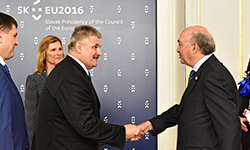BusinessEurope Headlines No. 2016-27
EU Ministers should adapt labour market policies to underpin digital transformation
 “The EU has the potential to become one of the most dynamic digital growth regions in the world. To derive maximum for all, we need open, dynamic and mobile labour markets and a workforce with the right skills.” This was the main message of the Chair of BusinessEurope’s Social Affairs Committee, Mr José Maria Lacasa, at the EU’s Informal Employment and Social Affairs Council held in Bratislava on 14-15 July. Mr Lacasa also emphasised the need to deal with the challenges of demographic change, encouraging EU Member States to continue with labour market and pension system reforms, and the need for more dynamic growth in Europe. Commenting on the European pillar of social rights, BusinessEurope stressed it can be helpful if it paves the way for stronger European coordination and more national ownership of the policies needed to reinforce competitiveness and job creation across Europe. (Photo: Handshake of Ján Richter, Slovak Minister for Labour, Social Affairs with José Maria Lacasa).
“The EU has the potential to become one of the most dynamic digital growth regions in the world. To derive maximum for all, we need open, dynamic and mobile labour markets and a workforce with the right skills.” This was the main message of the Chair of BusinessEurope’s Social Affairs Committee, Mr José Maria Lacasa, at the EU’s Informal Employment and Social Affairs Council held in Bratislava on 14-15 July. Mr Lacasa also emphasised the need to deal with the challenges of demographic change, encouraging EU Member States to continue with labour market and pension system reforms, and the need for more dynamic growth in Europe. Commenting on the European pillar of social rights, BusinessEurope stressed it can be helpful if it paves the way for stronger European coordination and more national ownership of the policies needed to reinforce competitiveness and job creation across Europe. (Photo: Handshake of Ján Richter, Slovak Minister for Labour, Social Affairs with José Maria Lacasa).
Contact: Rebekah Smith
CETA- European business asks for rapid implementation
 In a letter sent to the President of the European Council, Donald Tusk, BusinessEurope’s President and Director General called for CETA to be implemented as soon as possible. The letter recalls that CETA is the best agreement concluded so far by the EU as it has managed to obtain substantial gains in a number of key areas, ranging from market access for goods and services to public procurement and Geographical Indications. In its letter BusinessEurope also highlights the new relevance of CETA that goes beyond EU-Canada relations. In the current debate surrounding trade policy it is important to show that the EU can still deliver on trade, that it can still provide new trade and investment opportunities for its companies and it citizens and that it is still a reliable and trustworthy negotiating partner. For all these reasons it is of critical importance to have CETA provisionally applied as early as possible to make sure that the EU and Canada can fully enjoy the benefits of such an ambitious and comprehensive agreement.
In a letter sent to the President of the European Council, Donald Tusk, BusinessEurope’s President and Director General called for CETA to be implemented as soon as possible. The letter recalls that CETA is the best agreement concluded so far by the EU as it has managed to obtain substantial gains in a number of key areas, ranging from market access for goods and services to public procurement and Geographical Indications. In its letter BusinessEurope also highlights the new relevance of CETA that goes beyond EU-Canada relations. In the current debate surrounding trade policy it is important to show that the EU can still deliver on trade, that it can still provide new trade and investment opportunities for its companies and it citizens and that it is still a reliable and trustworthy negotiating partner. For all these reasons it is of critical importance to have CETA provisionally applied as early as possible to make sure that the EU and Canada can fully enjoy the benefits of such an ambitious and comprehensive agreement.
Read more or contact: Luisa Santos
Diversity is good for business – new BusinessEurope publication
 Promoting diversity can play a positive role in addressing today’s and tomorrow’s challenges in the labour markets and in workplaces. Companies are resorting to different approaches to promote diversity at all levels. With this new publication, BusinessEurope showcases concrete initiatives taken by its member federations and companies in the field of diversity that have already brought tangible results. These range from networks to internal targets, aiming to mobilise the potential of a wide range of diverse groups. By promoting these practices more widely we hope to encourage others to follow.
Promoting diversity can play a positive role in addressing today’s and tomorrow’s challenges in the labour markets and in workplaces. Companies are resorting to different approaches to promote diversity at all levels. With this new publication, BusinessEurope showcases concrete initiatives taken by its member federations and companies in the field of diversity that have already brought tangible results. These range from networks to internal targets, aiming to mobilise the potential of a wide range of diverse groups. By promoting these practices more widely we hope to encourage others to follow.
Read more or contact: Guillaume Cravero
Exchanging with and learning from Japan on social dialogue practices
 “The strength of social dialogue starts from a good dialogue at the workplace level. To support collective bargaining frameworks that leave appropriate space for social partners’ negotiations is key challenge according to the recent EU tripartite statement `new start for social dialogue´. Essential in this respect is that companies have enough flexibility to adapt their workforce to changing economic circumstances”. These were the key messages of Maxime Cerutti, BusinessEurope Social Affairs Director at the 16th EU-Japan symposium on `the role of labour-management relations in this changing current society´ that was held in Tokyo, 15 July 2016. “The recent EU tripartite statement is an opportunity to progress towards better functioning industrial relations for some European countries where this is needed. While being aware of the different cultural and historical contexts, the Japanese industrial relations practices centered on company level bargaining with national coordination in the form of the so-called `shunto´ is an interesting example to keep in mind”, he added.
“The strength of social dialogue starts from a good dialogue at the workplace level. To support collective bargaining frameworks that leave appropriate space for social partners’ negotiations is key challenge according to the recent EU tripartite statement `new start for social dialogue´. Essential in this respect is that companies have enough flexibility to adapt their workforce to changing economic circumstances”. These were the key messages of Maxime Cerutti, BusinessEurope Social Affairs Director at the 16th EU-Japan symposium on `the role of labour-management relations in this changing current society´ that was held in Tokyo, 15 July 2016. “The recent EU tripartite statement is an opportunity to progress towards better functioning industrial relations for some European countries where this is needed. While being aware of the different cultural and historical contexts, the Japanese industrial relations practices centered on company level bargaining with national coordination in the form of the so-called `shunto´ is an interesting example to keep in mind”, he added.
Contact Magda Bober
Need to accelerate emerging business models, bringing a more circular and collaborative approach into our economy
 “Driven by digitalisation and more collaborative platforms, emerging business models will scale up considerably in the coming decades. They will substantially contribute to economic growth and jobs. Europe should not lag behind. Therefore we need adequate conditions and a future-proof regulatory framework. The European Commission’s first efforts to ensure this go in the right direction.” Said Jan Bambas, Adviser at BusinessEurope at the policy debate organised by Aspen Institute Prague during the conference MELTINGPOT in Ostrava, Czech Republic, on 14 July. Jan Bambas explained concepts that are changing the old model from a linear to a circular approach, and to a new collaborative/sharing economy. With concrete examples he demonstrated how industry already implements these in practice, for instance by selling products as services. Together with other participants from OECD, Uber, MVO Nederland and Columbia University, he agreed that the EU needs to look for the right incentives and encourage collaboration by businesses and public administration, as well as consumers, to accelerate efforts to remain competitive.
“Driven by digitalisation and more collaborative platforms, emerging business models will scale up considerably in the coming decades. They will substantially contribute to economic growth and jobs. Europe should not lag behind. Therefore we need adequate conditions and a future-proof regulatory framework. The European Commission’s first efforts to ensure this go in the right direction.” Said Jan Bambas, Adviser at BusinessEurope at the policy debate organised by Aspen Institute Prague during the conference MELTINGPOT in Ostrava, Czech Republic, on 14 July. Jan Bambas explained concepts that are changing the old model from a linear to a circular approach, and to a new collaborative/sharing economy. With concrete examples he demonstrated how industry already implements these in practice, for instance by selling products as services. Together with other participants from OECD, Uber, MVO Nederland and Columbia University, he agreed that the EU needs to look for the right incentives and encourage collaboration by businesses and public administration, as well as consumers, to accelerate efforts to remain competitive.
Contact: Jan Bambas
 BusinessEurope Headlines will be back 8 September 2016 after the summer break! In the meantime the BusinessEurope team wishes you lovely holidays.
BusinessEurope Headlines will be back 8 September 2016 after the summer break! In the meantime the BusinessEurope team wishes you lovely holidays.